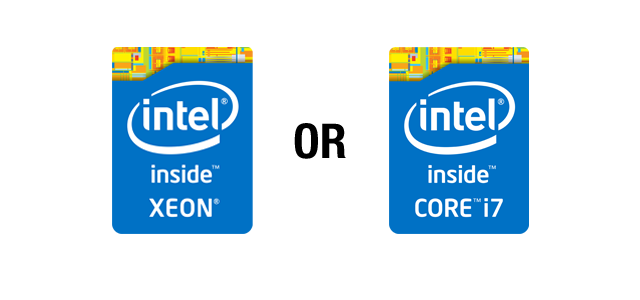Xeon vs i7/i5 – What’s the difference?

A standout amongst the most widely recognized inquiries we get when custom arranging a PC for a client is which stage they ought to run with – Xeon or i7. For the easygoing video editorial manager/workstation client, is Xeon better? What's the distinction between Xeon versus i7? How about we separate a couple of the Pros of every processor family.
Intel Core i7/i5 Pros
Overclocking – Unlocked i5 and i7 processors are intended to be overclocked, which means they can keep running at higher clock speeds than what they're fit the bill for, accepting the right voltage and BIOS settings. This compares to free power and more esteem, an element that Xeons don't have.
GHz per dollar – For immaculate Gigahertz speed for the cash, the 2011 and 1150 i7's ended up as the winner inevitably, making them the best esteem for single strung applications. For instance a 4-center i7-4790 running at 3.6GHz retails for around $300. The practically identical quad center Xeon running at that clock velocity will cost about $50 more.
On board design – i7 and i5 processors all accompany locally available representation, which means a discrete video card is not required for video show, while Xeon processor-based PCs can't be arranged without discrete video. In spite of the fact that we suggest a discrete card for anything past the most easygoing gaming or video work, on board illustrations are appropriate for some home office employments.
Xeon Pros
L3 reserve – CPU stores resemble little groups of memory that the processor keeps close by to accelerate certain applications. Most Xeon processors have 15-30MB of L3 store contingent upon the model, near twofold their i7 partners. This additional reserve is one motivation behind why Xeon's are such a great amount of speedier at appeal workstation applications than i7.
Support for ECC RAM – Error Checking and Correction (ECC) RAM distinguishes and amends most normal information defilement before it happens, killing the reason for some framework crashes and meaning more steady general execution. Just Xeon processors bolster ECC RAM.
More centers, multi CPU alternatives – If your applications require however many CPU centers as would be prudent, Xeon is the thing that you require. The new Xeon v3 processors maximize at 12 centers (24 subsequent to Hyperthreading) while even the new Haswell-E i7-5960X has only eight. Multi-CPU arrangements are likewise just conceivable with Xeon, as is included in our HD360MAX workstation.
Life span (under overwhelming burden) – Xeon processors are qualified to handle heavier, more concentrated burdens all the live long day. For the genuine workstation client, this can mean better life span over i7 partners.
Hyperthreading at a lower pricepoint – Most of the benefits of Xeon processors come to clients in a higher value range, however not this one. Since all Xeons accompany Hyperthreading – a procedure basically multiplying the CPU centers through the production of virtual centers – and i5 processors don't, numerous clients shopping in this value extent may observe the Xeons to be a superior worth, accepting their particular application bolsters these virtual centers.
So which is best for you? That answer relies on upon what you'll be utilizing your new PC for and the pricepoint at which you feel generally good. On the off chance that gaming or home and office undertakings are more your style where GHz pace is more essential than bountiful quantities of centers, or workstation applications on a spending where quality is basic, the i7's and i5's ought to be your decision. In case you're into moderate to top of the line workstation PC utilization like CAD outline, 4K video, and 3D rendering where the advantages of ECC RAM, more reserve, and conceivable double CPUs are beneficial, we generously suggest Xeon.

Leave a Comment